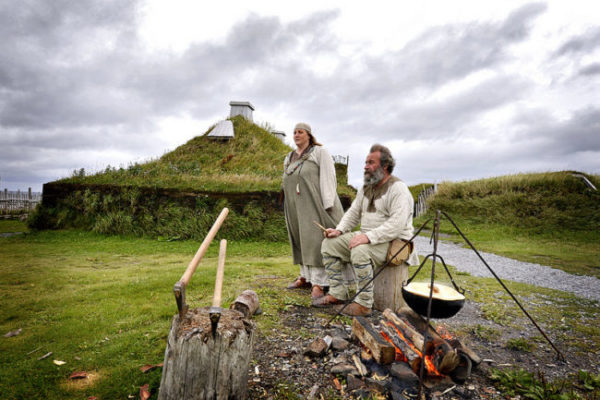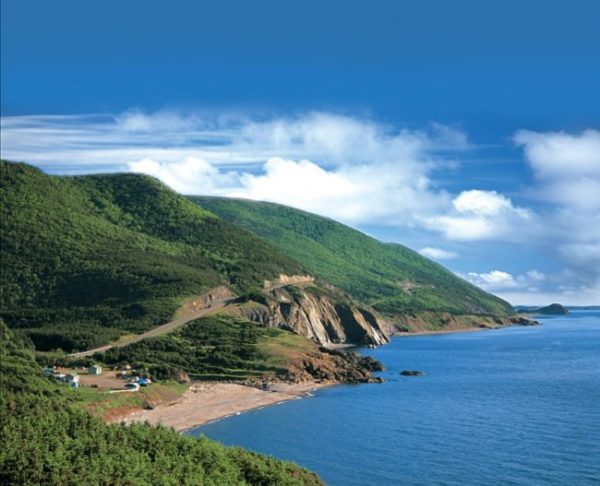The history of Newfoundland and the East Coast of Canada is an intriguing and intricate narrative, featuring a rich and diverse cultural legacy that has developed over thousands of years.
The Viking settlement at L’Anse aux Meadows in Newfoundland, Canada, stands as the only confirmed Viking site in North America. It was discovered in 1960 by Norwegian explorer Helge Ingstad and his archaeologist wife, Anne Stine Ingstad. This site was occupied by Viking explorers for a brief period around 1000 AD and is believed to have served as a base for further exploration into North America. Evidence suggests that the Vikings interacted with the region’s Indigenous people, as indicated by the discovery of butternuts, a native North American plant, at the site. The Vikings at L’Anse aux Meadows engaged in various activities, including boat repairs, metalworking, and hunting, all of which have left traces at the settlement. After just a few years, the settlement was abandoned for reasons that remain unclear to historians and archaeologists.
It is vital to acknowledge that the East Coast of Canada has been home to Indigenous peoples for over 10,000 years. This includes the Mi’kmaq, Maliseet, Innu, and Inuit communities, all of which play integral roles in the cultural, social, and economic fabric of the region. Many of these communities are actively working to reclaim their traditional languages and practices, promoting a deeper appreciation and understanding of their rich and varied cultural heritage. The town of Port au Choix hosts Port au Choix National Historic Site, which preserves and interprets four archaeological sites dating back over 3,500 years. These include Maritime Archaic burial grounds (among the largest hunter-gatherer burial sites in North America), Dorset Palaeoeskimo campsites, and Groswater Palaeoeskimo settlements.
The site features a visitor center with exhibits and displays detailing the history and culture of the area’s past inhabitants. Guests can view artifacts such as tools, weapons, and pottery used by these early peoples and learn about their daily lives and customs.

The arrival of European explorers and colonizers in the late 15th and early 16th centuries dramatically changed the course of the region’s history, particularly with the Portuguese, followed by the French and British. The first recorded European contact with Newfoundland occurred in 1498, when Portuguese explorer João Fernandes Lavrador arrived, while John Cabot famously claimed the territory for England in 1497.
In subsequent centuries, Newfoundland emerged as a vital center for the fishing industry, drawing fishermen from across Europe due to its plentiful cod stocks. The region also became a battleground in the conflicts between the French and British, culminating in the 1713 Treaty of Utrecht, which ceded control of Newfoundland to the British.
During the 19th and early 20th centuries, the region saw significant economic growth driven by the mining, forestry, and shipbuilding industries. However, the collapse of the cod fishery in the late 20th century triggered economic hardship and social upheaval, leading to considerable changes in the local economy and culture.

Another significant aspect of Newfoundland and the East Coast’s history involves their roles during both World Wars. During World War I, the region served as a critical base for the Canadian Expeditionary Force, with thousands of soldiers training in the challenging conditions of the Newfoundland wilderness before being deployed overseas. In World War II, Canada’s East Coast became essential for transporting troops and supplies to Europe, with Halifax emerging as a major naval base and convoy assembly point.
Today, Newfoundland and Canada’s East Coast continue to be celebrated for their rugged natural beauty, unique cultural heritage, and rich history. From the lively cities of Halifax and St. John’s to the remote fishing communities scattered along the coastline, this region offers visitors a captivating glimpse into a world that is both ancient and modern, rugged yet welcoming, and full of surprises around every corner. If you’re considering a visit to this remarkable part of Canada, we would be thrilled to assist you in planning your journey! We’re confident you won’t regret it.




